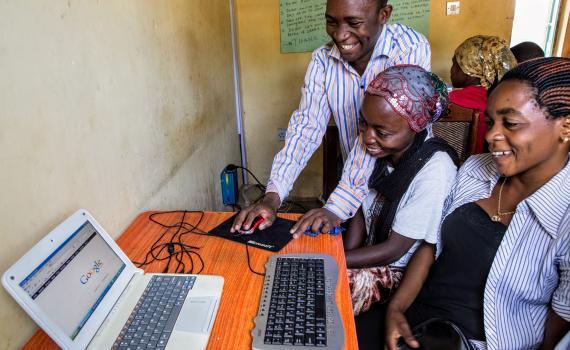
Just 48% of people in Uganda are using the internet, according to the Uganda Communications Commission (2019). The three main obstacles to internet use are lack of free or affordable access to technology, a lack of computer and online literacy skills, and limited awareness about the wealth of information, education, employment, communication and other opportunities the internet has to offer.
In 2021 the EIFL Public Library Innovation Programme (EIFL-PLIP) with partner organizations launched the ‘Digital skills and inclusion through libraries in Uganda’ project (‘Digital skills @ your local library’ for short). The project expands and takes forward EIFL-PLIP’s previous training for public librarians in Uganda. It aims to improve the capacity of public and community libraries to offer digital skills training in their communities, targeting women and unemployed youth, and connect them to free online learning opportunities that will improve their lives.
The project is supported by the Wehubit Programme implemented by the Belgian development agency, Enabel.
PROJECT PARTNERS
EIFL is working with -
- National Library of Uganda (NLU), which has a mandate to develop policies and set standards for public libraries in Uganda, and to facilitate delivery of library services.
- Maendeleo Foundation, a Uganda-based non-governmental agency that promotes development through digital and job skills training.
- 27 public and community libraries in different regions of Uganda that have computers and the internet available for public use.
- Peer 2 Peer University (P2PU), a USA-based non-governmental agency that promotes and facilitates lifelong learning outside of institutions. P2PU developed the learning circles methodology and hosts an online learning platform that provides access to high-quality free online courses.
PROJECT TIMELINE
2021 - 2023
ACTIVITIES
- Training librarians from the selected libraries in adult learning and facilitation skills, basic digital and mobile information literacy skills, internet searching, knowledge of local online resources and services, internet safety and how to facilitate learning circles.
- Raising awareness about free or affordable computer and internet access in libraries, digital skills training and learning circles, and reaching out to women and unemployed youth.
- Providing basic digital and mobile information literacy training for women and youth in libraries.
- Identifying knowledge and skills needs of women and unemployed youth, and organizing and facilitating learning circles that meet these needs, drawing on courses available through the P2PU online learning platform and other sources.
- Organizing digital literacy training camps for people living in remote rural areas.
ACHIEVEMENTS
Contributed to digital inclusion
- Over 22,000 people, mostly women and unemployed youth, completed basic digital and mobile information literacy training conducted in 27 public and community libraries and digital literacy camps. Of these -
- 6,500 people from different walks of life, including single mothers, street vendors, businesswomen, unemployed youth, teachers, and healthcare workers completed training in their local library.
- 1,000 people attended mobile digital literacy camps.
- 13,000 people were reached through library outreach events.
- 1,500 people completed online courses through learning circles (groups facilitated by librarians) organized in libraries, offering a wide range of entrepreneurial, technical, craft-making and other skills.
Built training capacity at libraries
- Built digital literacy and training skills of 50 librarians and volunteers at 27 public and community libraries, enabling them to provide basic ICT training in their communities.
Improved lives
Library trainees are using their new ICT skills to start small businesses, find jobs or get promoted, research the internet for ideas and information, study further, learn new technical and craft-making skills.
- ‘Now I have a job!’ Video about how Public library ICT training is changing lives in Uganda (EIFL 2023, YouTube, 6 min 37 sec).
- Impact stories 2023.
- Impact stories 2022.
- How entrepreneur Phionah Agaba and her group of craftswomen benefited from internet training offered by Mbarara City Library (Interview published in the EIFL Annual Report 2021).
Won recognition for libraries’ role in contributing to digital inclusion and improved libraries’ infrastructure
- Attracted requests for ICT training from local government departments, police, health service providers, schools and other local institutions.
- Attracted donations of additional computers from the public and private sectors -
Impact studies
- Read EIFL's case study, Local libraries equip people with life changing digital skills in Uganda, reflecting on results, impact and lessons learnt.
- See also EIFL's summary of findings of a survey to assess the impact of the project. The survey asked women and youth about their use of ICT since the training, and about how digital skills have contributed to their work, study, health and other aspects of daily life.
FURTHER INFORMATION
- Contact: Ugne Lipeikaite, EIFL-PLIP Impact Manager: ugne @ eifl.net
- More about EIFL’s capacity building programme for public librarians in Uganda





